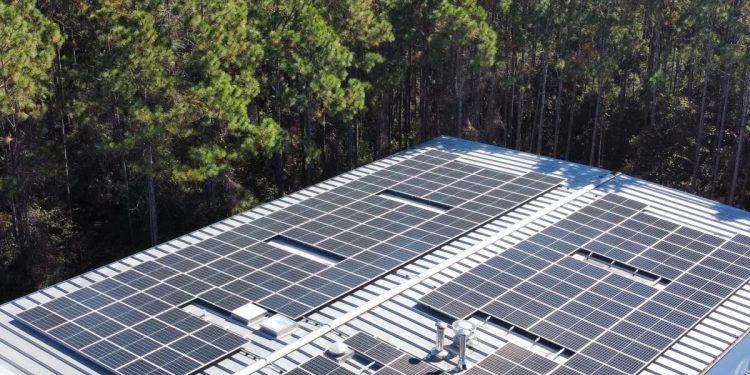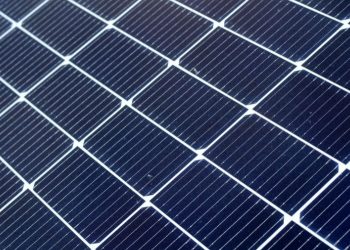Optimus Energy Solutions, a Mount Dora, Florida-based commercial, industrial and residential solar installer, sees market expansion opportunities in its neighboring state of Georgia as a new opportunity for securing new commercial PV projects and deploy EV charging stations.
Ben Pauluhn, chief executive officer and founder of Optimus Energy, told pv magazine USA that the developer sees Georgia as its strongest market for new commercial and industrial (C&I) solar projects and EV charging systems, where it is an installer of ChargePoint AC and DC fast charging systems. For now, though, the Floridian solar installer said he does not see a need to set up a second office in the Peach State.
At a current installation rate of about 2 MW per year of C&I projects (two-thirds of its revenue) and some residential projects (one-third of revenue), Pauluhn said Optimus aspires to deploy 3 MW to 5 MW of solar installations per year across both segments over the coming years. Additional projects in its home state and new projects within Georgia Power service territory could bring more business in for the developer as it expects to grow from its current 11 employee base into a larger organization.
Pauluhn founded the company in 2018 and in its first five years has doubled its installation rate each consecutive year as the company procures projects from Jacksonville, Fla., down to Tampa and the southern portion of the Sunshine State.
With favorable net metering framework across the state, Pauluhn said Optimus averages three residential installations per week and over the last year has deployed 2 MW per year of C&I market projects.
As a licensed American Solar Energy Society installer, Optimus’ residential contracts are performed by about half of its staff, which primarily services the central Florida region, while about half of its work in the region is sub-contracted out to local contractors, he said.
In the commercial market, Optimus installed projects for the hospitality, automotive dealership, consumer goods and various other markets across the Florida peninsula.

Image: Legacy Vacation Resorts
For energy storage, Pauluhn said Florida residents previously had a mismatched perception of how much battery storage is needed at homes to drive down electricity costs when Floridians typically require continuous use of air conditioning systems, creating a huge load drain on the electric grid.
“Air conditioner usage pushes for much larger solar systems, especially because gas service is not that prevalent in Florida, so almost all power consumed in the home is electric,” Pauluhn said. The mismatch on air conditioner sizing to batteries is evident as battery sizes are needed to be upsized to start up multiple large loads like compressors and wells used in HVAC or home solutions, he said.
Nowadays, Optimus is deploying about 10% of rooftop residential projects with an attached storage system using Enphase, SolarEdge or DuraCell Power Center battery systems, while the company regularly uses REC Solar panels for residential PV installations and JinkoSolar panels for C&I projects, he said. The company also uses SolarEdge microinverters and Ironridge racking systems, he added.

In EV charging, the company has deployed a single-digit attachment rate worth of charging stations to primarily residential customers across Florida. Optimus is an exclusive ChargePoint installer of Level 2 AC charging and DC fast charging products for the growing Southeast EV market.
In its first five years, Optimus has secured sizable C&I contracts around its home state. Just last month, the installer secured a 1.51 MW commercial project for Legacy Vacation Resorts, a resort hotel operator, to deploy 200 kW to 760 kW rooftop PV systems across four hotel properties in central Florida.
After the Legacy projects, Pauluhn said Optimus has another two C&I projects in the works for Q3 2023, which would add another 1 MW of installations to the company’s development schedule for the year, rounding out the year at more than 2.5 MW.
Asked about the Inflation Reduction Act and domestic content sourcing, Pauluhn said the regional solar developer aspires to source as much components as possible in the coming years from local resources and U.S.-made systems. For Legacy, Optimus is procuring 3,700 domestically-assembled JinkoSolar 410 W modules, which are being distributed straight from the supplier’s Jacksonville, Fla., facility to instate project sites, providing an easy procurement for the developer, Pauluhn said.
Climate First Bank, a regional FDIC-insured community banking group, is a financial partner of the company and has securitized financing of the company’s Legacy resort portfolio. Pauluhn said the bank, which finances Southeastern clean energy developers and corporations with sustainability goals, is also a commercial bank lender to the small business.
Asked about Florida Governor and presidential candidate Ron DeSantis, Pauluhn said since the governor took office in 2019, he has taken a pro-rooftop solar and small business-friendly stance. On April 27, 2022, DeSantis vetoed state legislation, HB-741, which would have ended net metering in Florida as proposed by its various utilities.
To date, Optimus Energy has been self-funded by management and sees itself as an employee-run company, Pauluhn said.
This content is protected by copyright and may not be reused. If you want to cooperate with us and would like to reuse some of our content, please contact: editors@pv-magazine.com.


















